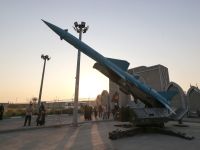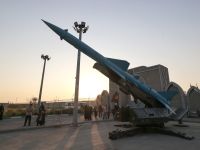Everyday, thousands of jobless Yemenis attempt to illegally enter Saudi Arabia seeking work opportunities in the neighboring oil-rich Gulf country. And the number is now rapidly on the rise, after hundreds of thousands of Yemenis have lost their jobs in Yemen because of the six-month long nationwide uprising against President Saleh’s 33-year rule.
Dozens of Yemenis reportedly die every month in the Saudi deserts for lack of water or food on their perilous journey to find work over the border.
Mahmoud Sagheer, 30, a Yemeni from Mahwit left for the Saudi border two weeks ago in search of work. Mahmoud found himself without work when he could no longer find fuel for the truck he drove. He decided to try and enter Saudi Arabia illegally to feed and provide for his family of five.
“He used to work as a driver for his father’s truck carrying food and staff from the city of Hodeida to our village, but with the fuel shortage he was forced to stop driving. He decided to infiltrate into Saudi Arabia for work,” his wife, Um Ahlam, told the Yemen Times.
“All the youth here, who are mostly jobless, have fled the village to Saudi Arabia to generate a living income for their families,” she said.
Over 45 percent of Yemenis are jobless, and with the financial and economic stagnation caused by the Yemen’s current political upheavals, the number is undoubtedly going to rise.
According to Dr. Mohammad Jubran, a professor of economics at the University of Sana’a, around 150,000 Yemeni workers have been laid off from the industrial and service sectors. Power cuts and the acute shortage in fuel have caused 80 percent of factories to shut down.
Over 90 percent of jobless men in Yemen’s northern rural areas, especially in the governorates of Hajja, Al-Mahwit, Sa’ada, Hodeida and Amran, head to Saudi Arabia’s southern border to find work, according to Khaled Jailan, a social figure in Mahwit.
Jailan himself has experienced the miserable experience of trying to illegally enter Saudi Arabia. He explained that most of the men end up working in construction and building, sheep herding and farming. He added that trying to enter Saudi Arabia without legal documents was highly risky, and cost a lot of effort, time, and sometimes even lives.
“I know of three in my village who died on their way to Saudi Arabia. They were struck by lightning in the Saudi dessert,” said Jailan.
Abu Saber, 35, who recently entered Saudi Arabia illegally, told the Yemen Times of the pain and terror he experienced on his journey to try and find a job opportunity.
“I spent 14 days traveling from Al-Mashnaq to Amhayl. I walked and ate at villages or some farms,” said Abu Saber.
The Amhayl area in Saudi Arabia is a smuggling transit point, where Yemenis are taken by Saudi smugglers to different destinations including Jeddah, Riyadh, Al-Tayf and other cities.
“We spent our journey with no money to use. There was one friend from Aden who had some [money] and he was helping us,” he said.
“When we approached Amhayl, a Saudi smuggler picked us up in a car. There were only two seats in the front free, and we eleven migrants crowded ourselves in the rest of car›s space,” he said.
“We drove in the desert for two hours and then negotiations started on the price. We agreed to pay him SR 2,500 to take us to Jeddah, to be paid to him at the destination point,” Abu Saber said.
“During the three-day smuggling journey from Amhayl to Jeddah, the driver let us out of the car into a room to rest. But with no food or anything to drink we ran away.”
“After some hours, the Saudi smuggler appeared following us with a gun in his hand. He collected us one after another and brought us back to the car. He said to us ‘Did you not say that you are good men with respected tribal traditions?‘ We replied saying ‘You left us hungry, thirsty and for that we fled.’ Then he brought some cakes and juice for us to eat and we continued to our destination.”
In the Al-Bahra area of Jeddah the smuggler placed the would be workers at an inn to take his payment from them, according to Abu Saber. While the Yemeni migrants were trying to contact their relatives in Jeddah to pay the fare, a group of the plain clothes passport police found them.
“They inspected us very carefully because they found drugs with the driver. They disagreed amongst themselves about whether to let us go or to deport us,” he said. “Eventually they agreed to let us go and find work.”
“After that I took a taxi to my relative’s house in Jeddah where I stayed for one week. Later I planned to go to Mecca, but I was caught traveling from Jeddah to Mecca,” he recalled.
“I was held for 12 days in a deportation center in Jeddah. It was full of Yemeni migrants who had come for the same purpose, to work. After that they took us by bus to Al-Tiwal. Here we were thrown out with no money or anything to help us go back home,” Abu Saber said.
Ali Al-Wafi, a Yemeni economist and former chairman of the parliamentary financial committee, told the Yemen Times that “Yemen has entered an economic collapse, and Saudi Arabia will be affected by different aspects of this situation.”
“Many problems will be aggravated along the Saudi southern border, including security, smuggling, children and drugs trafficking,” he said. According to Al-Wafi the biggest consequence to the Saudis of the economic collapse will be the thousands of Yemenis who will go to the border asking for relief.
“If Yemen does not get out of this crunch soon, the economic collapse will ruin all possible political solutions,” he said.

Al Bawaba







